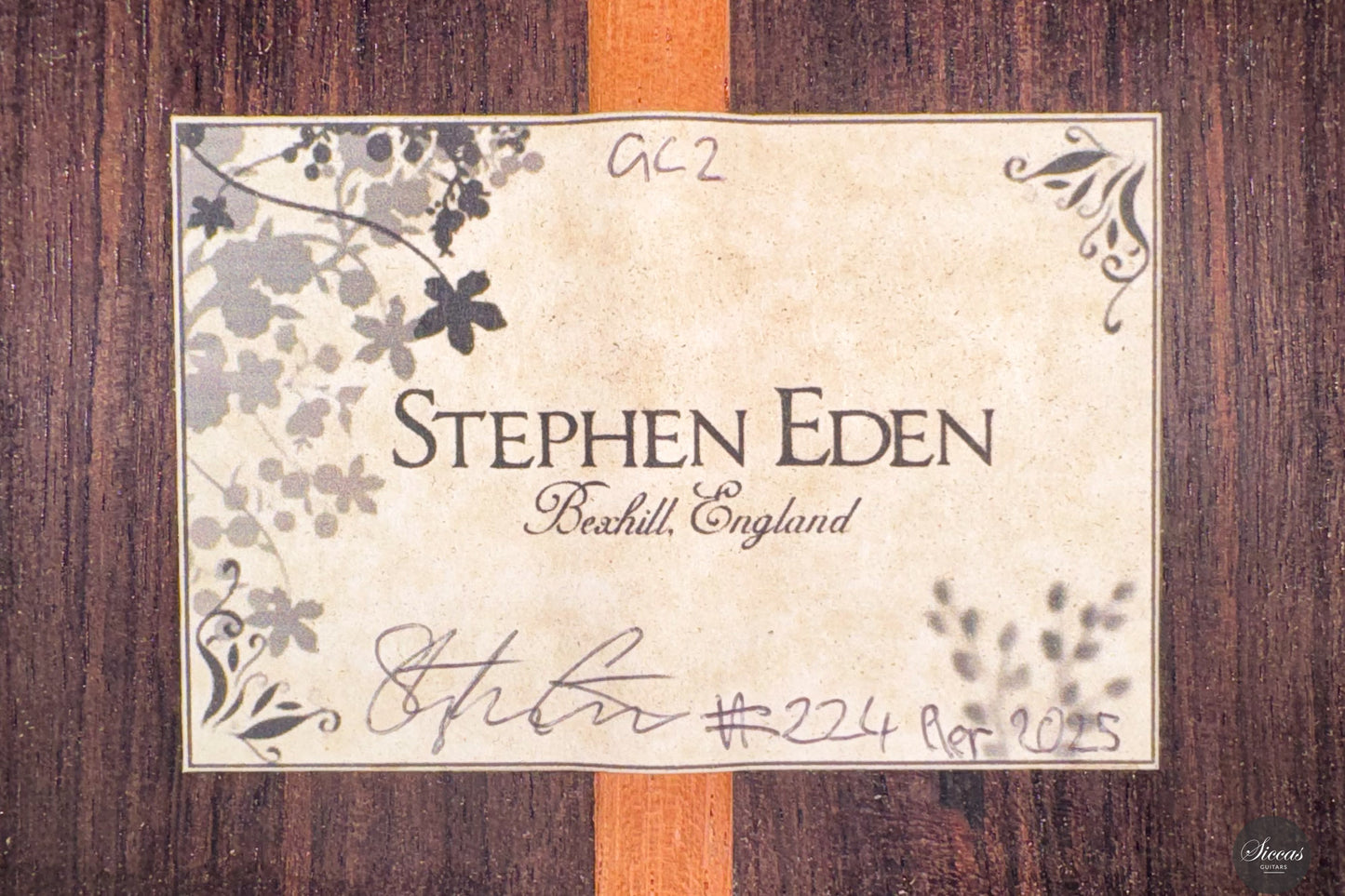Stephen Eden - 2025 - No.224 Grand Concert
Stephen Eden - 2025 - No.224 Grand Concert
Details
Details
Overview
Overview
Shipping important note
Shipping important note
Delivery times are typically reliable and most instruments arrive within the estimated timeframe.
Should any unexpected delay occur, our team will keep you informed and provide support at every step. For all shipping details and exceptions, please see our Shipping Policy.
Details about GPSR
Details about GPSR
























Video overview


More details about the guitar
About the luthier
Stephen Eden is a British luthier based in Bexhill on Sea, UK, whose journey into guitar making began in 2004 with evening classes under Stephen Hill. This early inspiration led to a traditional two-year apprenticeship with Pablo Requena, where Stephen laid the foundations for a lifelong career in lutherie. He set up his first workshop in 2008 and has been refining his own sound and techniques ever since. Stephen’s work is deeply inspired by varied masters, with notable influences from Torres, Santos Hernández, Hermann Hauser, and Daniel Friederich. His close collaboration with Miles Roberts of Kent Guitar Classics provided access to important historic instruments, including original Friederich and Hauser guitars, enriching his understanding of tone and construction. Over the years, he has built guitars for a wide range of internationally renowned performers, and his instruments have found homes across nearly every continent.About the guitar
This 2025 Grand Concert, No. 224, is Stephen’s personal interpretation of the Friederich concept, blending Granadan and Parisian construction influences. The guitar features a spruce soundboard and Indian rosewood back and sides, all finished with a fine French polish. The sides are doubled, constructed from two full-thickness layers of wood, resulting in a particularly rigid body structure that supports projection and sustain. The top is built lighter and braced more rigidly, allowing greater responsiveness and clarity while maintaining power. These construction choices culminate in an instrument that offers a bold, singing voice with a Spanish character, enhanced by the control and focus on the fundamental note that are hallmarks of Friederich’s legacy. This is not a replication, but a reinterpretation made with respect and artistic freedom. The Grand Concert model offers a rich tonal spectrum with excellent projection and long sustain. Players will appreciate the control it provides in both lyrical passages and demanding technical repertoire. The guitar responds easily to subtle dynamics, while its structural design ensures stability and tonal focus even at high volume. The doubled sides contribute to its depth and clarity, making it a versatile and expressive instrument suited for both stage and studio. The feel is refined, the craftsmanship outstanding, and the attention to playability evident in every detail, from its setup to its premium Klaus Scheller tuners.Regular care extends the life of the instrument
Even with careful use, a classical guitar may gradually change in appearance or respond to unstable storage conditions. Have a close look at your guitar regularly and be attentif to changes. If your instrument is suffering from its environement, it will let you know.
Protect Your Guitar: Handle with Care
Be mindful when touching your instrument with greasy or unwashed hands: any skin contact is a small attack on the varnish. Of course, a guitar is made to be played, but taking a few precautions helps preserve its beauty: wash your hands before playing, wear long sleeves, and avoid unnecessary direct skin contact with the body of the instrument.
Pro tip: Avoid playing with a button-up shirt, heavy jewelry, or a belt, as these can scratch the guitar. Also, make sure your guitar case is free of any objects that could damage the instrument during storage.
String care
A good habit to adopt is wiping down your strings briefly after each playing session. This small action significantly extends their lifespan and helps maintain a consistent, comfortable feel under your fingers.
Most importantly, clean strings are essential for keeping your instrument in tune. Corrosion, sweat, and dust can affect the uniformity of the strings and interfere with accurate tuning across the entire fingerboard.
Pro tip: If you're having trouble getting your guitar in tune, it might be time to change the strings. A useful test is to compare the pitch of the 12th fret harmonic with the fretted note at the 12th fret; if there's an unusually large gap between them, your strings may have lost their integrity and should be replaced.
Keep Your Shellac Finish Shining!
Got a guitar with a shellac (French polish) finish? Here's a simple trick: Take a clean microfiber cloth and gently breathe on the surface to create a light mist. Then, softly rub to remove fingerprints, sweat, and grease. That’s usually all it takes to keep it looking great, no products needed!
Pro tip: Every few years, treat your guitar to a check-up with a luthier to keep it in top shape.
Storing Your Guitar: Climate Matters
Your guitar can safely stay outside its case, as long as the surrounding environment maintains 42–55% humidity and a temperature between 18–25°C.
Keep in mind that humidity levels can still fluctuate inside the case, especially during seasonal changes.
- Too much humidity may cause overtightened strings and a dull tone.
- Too little humidity can lead to a bulging top, string buzz, or even cracks.
Avoid placing your guitar near radiators, air conditioners, or windows with direct sunlight.
Pro tip: Always close your guitar case while playing. This helps preserve a stable microclimate inside the case, so your instrument is protected the moment you put it back in.



















































